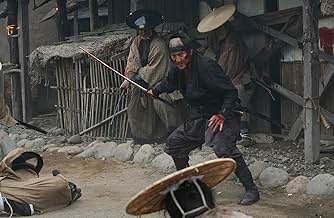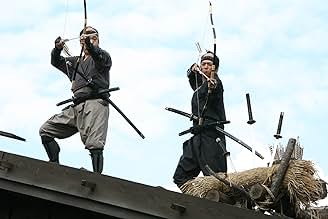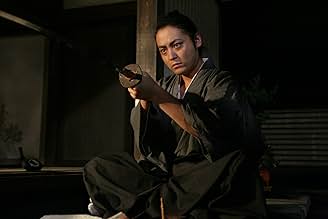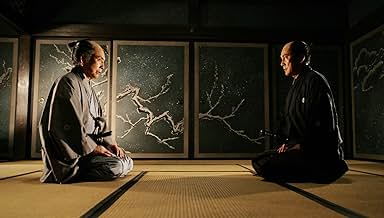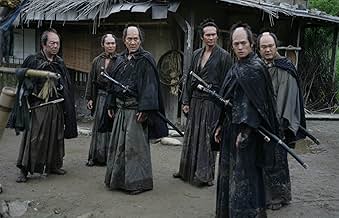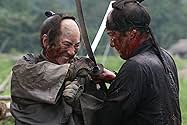AVALIAÇÃO DA IMDb
7,5/10
71 mil
SUA AVALIAÇÃO
Um grupo de assassinos se reúne em uma missão suicida para matar um senhor malvado.Um grupo de assassinos se reúne em uma missão suicida para matar um senhor malvado.Um grupo de assassinos se reúne em uma missão suicida para matar um senhor malvado.
- Direção
- Roteiristas
- Artistas
- Prêmios
- 15 vitórias e 28 indicações no total
- Direção
- Roteiristas
- Elenco e equipe completos
- Produção, bilheteria e muito mais no IMDbPro
Avaliações em destaque
This is an epic masterpiece and is clearly a cut above most films in direction, acting, and cinematography. But what really sets it apart is that it connects the viewer to Bushido and has those values firmly at its core.
The sadistic tyrant who must be assassinated or Japan will turn once more to feudal warfare is told with verve and elan, but also with real dignity and a great sense of pace. The first hour is simply superb as we watch the recruiting and planning of the assassins. The second hour is a maelstrom of action with katanas flashing and impossible odds. I actually preferred the first half in the main, but absolutely no complaints with the action either.
All in all, this is simply, by far and away, the best action film of 2011 so far, but putting in a genre does not do it justice - for this reviewer, it is the most complete cinematic experience since Winter's Bone and is that rare animal these days - a film that looks, feels, and produces the sensation of film rather than TV.
Probably one of the better films (Japanese or otherwise) I have seen this decade without exaggeration - it actually attempts to embody Bushido and understand the meaning and purpose of the Shogunate and the Samurai - plus Katanas - oh yes - lots and lots of katanas.....
The sadistic tyrant who must be assassinated or Japan will turn once more to feudal warfare is told with verve and elan, but also with real dignity and a great sense of pace. The first hour is simply superb as we watch the recruiting and planning of the assassins. The second hour is a maelstrom of action with katanas flashing and impossible odds. I actually preferred the first half in the main, but absolutely no complaints with the action either.
All in all, this is simply, by far and away, the best action film of 2011 so far, but putting in a genre does not do it justice - for this reviewer, it is the most complete cinematic experience since Winter's Bone and is that rare animal these days - a film that looks, feels, and produces the sensation of film rather than TV.
Probably one of the better films (Japanese or otherwise) I have seen this decade without exaggeration - it actually attempts to embody Bushido and understand the meaning and purpose of the Shogunate and the Samurai - plus Katanas - oh yes - lots and lots of katanas.....
Taksshi Mike gives a new face to the 1963 classic '13 Assassins' and he has executed it at grandeur level portraying an event which took place in Japans feudal era.
When an evil and sadistic lord is bringing horror to countrymen, few Samurais who were once loyal to the throne foresee a greater danger. If this Lord Naritsugu Matsudaira plunges himself to the throne in near future the country will be devastated and torn with war. Thus these brave set of men creates a silent and elite secret force in order to assassinate the lord. Gathering only 13 men to their force they fearlessly goes head to head against an army of 200 to fulfill their goal. Brutal and merciless Samurai swords speak for themselves.
This movie is a wonder of its own creation. It brings out ancient lifestyle of Japan in to light with details. And more than that the spirit of the brave Samurais are making the plot truly strong and when they fall and die one by one still they keep the heads high and hearts strong. Courage and determination of a worrier may not seem this strong in any recent movie which I recall.
However be warned that 13 Assassins is not an easy movie to digest. It has blood and gore in great volumes and violence sometimes you might not really expect. Yet they are important in order make the story run to your blood stream. And once the war hits the screen after a long and silent slow momentum, it goes right until the end which is nearly 30-40 mts. So you might actually lose the count of killing.
My reviews at flickshout.tk
When an evil and sadistic lord is bringing horror to countrymen, few Samurais who were once loyal to the throne foresee a greater danger. If this Lord Naritsugu Matsudaira plunges himself to the throne in near future the country will be devastated and torn with war. Thus these brave set of men creates a silent and elite secret force in order to assassinate the lord. Gathering only 13 men to their force they fearlessly goes head to head against an army of 200 to fulfill their goal. Brutal and merciless Samurai swords speak for themselves.
This movie is a wonder of its own creation. It brings out ancient lifestyle of Japan in to light with details. And more than that the spirit of the brave Samurais are making the plot truly strong and when they fall and die one by one still they keep the heads high and hearts strong. Courage and determination of a worrier may not seem this strong in any recent movie which I recall.
However be warned that 13 Assassins is not an easy movie to digest. It has blood and gore in great volumes and violence sometimes you might not really expect. Yet they are important in order make the story run to your blood stream. And once the war hits the screen after a long and silent slow momentum, it goes right until the end which is nearly 30-40 mts. So you might actually lose the count of killing.
My reviews at flickshout.tk
Samurai films tend to lean toward either overly talkative and boring or hyper-stylized to the point that credibility comes into question. Striking that middle ground, however, can lead to greatness, or rather — great honor. Takashi Miike's "13 Assassins" might not match the great Akira Kurosawa films, but boy does it come close, and it does so with themes and blades of equal sharpness.
If swords-and-sandals flick "300" had been less concerned about abs and Gerard Butler screaming war hyperbole, it would have looked and felt like this film. Anyone who hails Zack Snyder's 2006 film as a masterpiece should pull up a seat with this film for two-plus hours and see how it's really done.
Both the aforementioned film to which comparison is inescapable and "13 Assassins" tell a story about how the number of men indicated in their titles fought against an army numerous times the size. In this film, the reasons for fighting a battle most certain to result in death are less glossy and brash, as well as guided by some consideration for historical relevance.
The story takes place at nearly the end of feudal era Japan, when samurai have become nothing but show thanks to a lengthy time of peace. Yet one lord seems to undermine this peace with acts of cold-blooded violence: the shogun's half brother, Lord Naritsugu (Gorô Inagaki). It is expected, however, that when he returns from Edo, he will have a place on the shogun's council and have political influence to go with with warmongering ways. After a respected samurai commits harakiri in protest, the elder of the shogun council charges a samurai named Shinzaemon (Kôji Yakusho) with putting together a squad of samurai to kill Naritsugu before there's widespread unrest.
The beginning of the film shows us Naritsugu's cold and horrifying ways with enough brutal imagery to make anyone want to pick up a sword against this guy. The story then continues with the assembling of the 12 assassins (the 13th comes later) and their strategy for accomplishing the task. Yet on the other side is Hanbei Kitou (Masachika Ichimura), the samurai sworn to obey and protect Naritsugu who must develop counter-strategy to foil Shinzaemon, an old classmate of his from the dojo.
The game of strategy boils toward a 45-minute climactic battle in which the 13 assassins use everything from trickery to explosives to straight-up sword hackery against an army of 200 men from Naritsugu's clan. The delivery of these sequences rivals any modern action film, and that includes battle cries, little humorous lines tossed in for fun and especially creativity. One samurai takes out 30-plus guys in a narrow corridor that he prepped ahead of time with several swords carefully stationed throughout.
But most impressively, "13 Assassins" never loses sight of what its whole conflict is about. The plot doesn't exist merely as a formula guaranteed to produce an unforgettable culminating battle. Throughout the entire film, characters are questioning the values passed down to them for hundreds of years of honor and duty. Having essentially stood their whole lives as symbols of a fading age, they take on this quest in search of finally fulfilling that purpose of total commitment and servitude, yet this battle will teach them what it truly means.
Essentially, this is not the same movie if set in another time or another place, which sets it apart as a truly great action film. As replicable as a story of a small band of skilled warriors taking on the impossible is (it possesses a great number of similarities to what's considered the best of its kind, Kurosawa's "Seven Samurai," for one), writers Kaneo Ikegami and Daisuke Tengan give "13 Assassins" its own thumbprint with the context.
Miike then delivers the full impact of all the tones from pure syrupy action to dark, shocking drama. He knows exactly how to take a high-tension scene to a whole other level by creating a full spectrum of what we see versus what is kept from us, especially in terms of violence. As soon as he wants to export those talents to Hollywood, someone better answer. We could use more action films like "13 Assassins."
~Steven C
Visit my site! moviemusereviews.com
If swords-and-sandals flick "300" had been less concerned about abs and Gerard Butler screaming war hyperbole, it would have looked and felt like this film. Anyone who hails Zack Snyder's 2006 film as a masterpiece should pull up a seat with this film for two-plus hours and see how it's really done.
Both the aforementioned film to which comparison is inescapable and "13 Assassins" tell a story about how the number of men indicated in their titles fought against an army numerous times the size. In this film, the reasons for fighting a battle most certain to result in death are less glossy and brash, as well as guided by some consideration for historical relevance.
The story takes place at nearly the end of feudal era Japan, when samurai have become nothing but show thanks to a lengthy time of peace. Yet one lord seems to undermine this peace with acts of cold-blooded violence: the shogun's half brother, Lord Naritsugu (Gorô Inagaki). It is expected, however, that when he returns from Edo, he will have a place on the shogun's council and have political influence to go with with warmongering ways. After a respected samurai commits harakiri in protest, the elder of the shogun council charges a samurai named Shinzaemon (Kôji Yakusho) with putting together a squad of samurai to kill Naritsugu before there's widespread unrest.
The beginning of the film shows us Naritsugu's cold and horrifying ways with enough brutal imagery to make anyone want to pick up a sword against this guy. The story then continues with the assembling of the 12 assassins (the 13th comes later) and their strategy for accomplishing the task. Yet on the other side is Hanbei Kitou (Masachika Ichimura), the samurai sworn to obey and protect Naritsugu who must develop counter-strategy to foil Shinzaemon, an old classmate of his from the dojo.
The game of strategy boils toward a 45-minute climactic battle in which the 13 assassins use everything from trickery to explosives to straight-up sword hackery against an army of 200 men from Naritsugu's clan. The delivery of these sequences rivals any modern action film, and that includes battle cries, little humorous lines tossed in for fun and especially creativity. One samurai takes out 30-plus guys in a narrow corridor that he prepped ahead of time with several swords carefully stationed throughout.
But most impressively, "13 Assassins" never loses sight of what its whole conflict is about. The plot doesn't exist merely as a formula guaranteed to produce an unforgettable culminating battle. Throughout the entire film, characters are questioning the values passed down to them for hundreds of years of honor and duty. Having essentially stood their whole lives as symbols of a fading age, they take on this quest in search of finally fulfilling that purpose of total commitment and servitude, yet this battle will teach them what it truly means.
Essentially, this is not the same movie if set in another time or another place, which sets it apart as a truly great action film. As replicable as a story of a small band of skilled warriors taking on the impossible is (it possesses a great number of similarities to what's considered the best of its kind, Kurosawa's "Seven Samurai," for one), writers Kaneo Ikegami and Daisuke Tengan give "13 Assassins" its own thumbprint with the context.
Miike then delivers the full impact of all the tones from pure syrupy action to dark, shocking drama. He knows exactly how to take a high-tension scene to a whole other level by creating a full spectrum of what we see versus what is kept from us, especially in terms of violence. As soon as he wants to export those talents to Hollywood, someone better answer. We could use more action films like "13 Assassins."
~Steven C
Visit my site! moviemusereviews.com
In 1844, the peace of the Feudal Japan is threatened by the cruel Lord Naritsugu Matsudaira (Gorô Inagaki) that is politically rising and getting closer to his half-brother, the shogun. After the harakiri of Namiya clan leader, the samurai Shinzaemon Shimada (Kôji Yakusho) is summoned by the shogun's adviser Sir Doi (Mikijiro Hira) of the Akash Clan to listen to the tragedy of Makino Uneme ((Takumi Saitô), whose son and daughter-in-law have been murdered by Naritsugu. Then Sir Doi shows a woman with arms, legs and tongue severed by Naritsugu and she writes with her forearm a request to Shinza to slaughter Naritsugu and his samurais.
Shinza promises to kill Naritsugu and he gathers eleven other samurais and plots a plan to attack Naritsugu in his trip back to the Akash land. But the cunning samurai Hanbei Kitou (Masachika Ichimura) that is responsible for the security of his master foresees Shinza's intent. Shinza decides to go with his samurais through the mountain, where they find the hunter Koyata (Yûsuke Iseya) that guides them off the mountain and joins the group. Now the thirteen men prepare an ambush to Naritsugu and his army of two hundred samurais in a suicide mission to stop evil.
"Jûsan-nin no shikaku", a.k.a, "13 Assassins", is a future classic of the samurai genre by Takashi Miike. It is inevitable to compare this film with Akira Kurosawa's "Seven Samurais" and the epic "The 300 Spartans", but "13 Assassins" is among the best samurais movies I have ever seen, with a solid story in the Edo period of Japan, stunning cinematography, wonderful performances and fantastic choreography in the battle scenes. My vote is nine.
Title (Brazil): "13 Assassinos" ("13 Assassins")
Shinza promises to kill Naritsugu and he gathers eleven other samurais and plots a plan to attack Naritsugu in his trip back to the Akash land. But the cunning samurai Hanbei Kitou (Masachika Ichimura) that is responsible for the security of his master foresees Shinza's intent. Shinza decides to go with his samurais through the mountain, where they find the hunter Koyata (Yûsuke Iseya) that guides them off the mountain and joins the group. Now the thirteen men prepare an ambush to Naritsugu and his army of two hundred samurais in a suicide mission to stop evil.
"Jûsan-nin no shikaku", a.k.a, "13 Assassins", is a future classic of the samurai genre by Takashi Miike. It is inevitable to compare this film with Akira Kurosawa's "Seven Samurais" and the epic "The 300 Spartans", but "13 Assassins" is among the best samurais movies I have ever seen, with a solid story in the Edo period of Japan, stunning cinematography, wonderful performances and fantastic choreography in the battle scenes. My vote is nine.
Title (Brazil): "13 Assassinos" ("13 Assassins")
I'm a little wary of films from Takashi Miike as, although they are generally received as good, my experience of them has been that they are bloody and very odd. Thirteen Assassins though seemed a bit more accessible in terms of being more straightforward, which in some ways then makes the violence a little easier to watch. The plot here sees the amoral behaviour of Lord Naritsugu infuriate a small group of men who, led by veteran samurai Shinzaemon, set out to trap him and his 100+ entourage of guards (led by samurai Hanbei) in order to kill him and end his rise to power for the greater good.
This plot essentially cuts the film in half. The first half of the film is the setup and is mostly dialogue driven. It is slow and patient but not dull as the main thing it does is to turn the main character (and the audience) against Naritsugu by virtue of the terrible things he has done. This is brutal and quite shocking in regards some of the things we see, half-see or view the aftermath of. At the same time it gives us some time to get to know the thirteen main characters; although there is an air of honour to all of them, the characters do have traits of humour, weakness, anger and so on, which mark them out but also add some colour to the telling. The second half of the film begins when the trap is sprung and a small village becomes a contained killing field soon to be filled with bodies and blood.
I had wondered how I would find this because there was always the potential that action involving this size of a crowd would just be a mess of flailing and blood and that it wouldn't have any tension or flow to it. To a certain extent, this is a bit of a problem at times but mostly Miike overcomes it by splitting up the characters across the village and mixing smaller conflicts with bigger ones. You do still need to buy the sight of tired individual men cutting through a stream of 20 men but the narrative sort of makes this easy (it is a time of peace with a lower standard of samurai) but also it isn't all this type of action. It is bloody but without being overly gory for the sake of it. The delivery manages to make me believe the concept of the honourable death (not something I do normally) because of how dishonourable Naritsugu is and how likable Shinzaemon is throughout. The cast do well in this regard not only to make characters but also to remain distinguishable in the midst of the chaos and blood. Yakusho is strong in the lead and he contrasts well with Ichimura and Inagaki well; both of whom are also good even if Inagaki has a bit of an open goal in regards doing a simple amoral character. The supporting cast are good and mix their characters well with my favourite being Iseya who is fun and funny even if what his character represents sort of doesn't work for my western viewpoint.
Overall though, Thirteen Assassins is an engaging film that has good build-up which explodes into chaos and violence for the second half. I don't think it is perfect but in fairness some of the problems I had with it came with the plot and the territory, so they are not failings so much as just part of the film.
This plot essentially cuts the film in half. The first half of the film is the setup and is mostly dialogue driven. It is slow and patient but not dull as the main thing it does is to turn the main character (and the audience) against Naritsugu by virtue of the terrible things he has done. This is brutal and quite shocking in regards some of the things we see, half-see or view the aftermath of. At the same time it gives us some time to get to know the thirteen main characters; although there is an air of honour to all of them, the characters do have traits of humour, weakness, anger and so on, which mark them out but also add some colour to the telling. The second half of the film begins when the trap is sprung and a small village becomes a contained killing field soon to be filled with bodies and blood.
I had wondered how I would find this because there was always the potential that action involving this size of a crowd would just be a mess of flailing and blood and that it wouldn't have any tension or flow to it. To a certain extent, this is a bit of a problem at times but mostly Miike overcomes it by splitting up the characters across the village and mixing smaller conflicts with bigger ones. You do still need to buy the sight of tired individual men cutting through a stream of 20 men but the narrative sort of makes this easy (it is a time of peace with a lower standard of samurai) but also it isn't all this type of action. It is bloody but without being overly gory for the sake of it. The delivery manages to make me believe the concept of the honourable death (not something I do normally) because of how dishonourable Naritsugu is and how likable Shinzaemon is throughout. The cast do well in this regard not only to make characters but also to remain distinguishable in the midst of the chaos and blood. Yakusho is strong in the lead and he contrasts well with Ichimura and Inagaki well; both of whom are also good even if Inagaki has a bit of an open goal in regards doing a simple amoral character. The supporting cast are good and mix their characters well with my favourite being Iseya who is fun and funny even if what his character represents sort of doesn't work for my western viewpoint.
Overall though, Thirteen Assassins is an engaging film that has good build-up which explodes into chaos and violence for the second half. I don't think it is perfect but in fairness some of the problems I had with it came with the plot and the territory, so they are not failings so much as just part of the film.
Você sabia?
- CuriosidadesThe opening sequence of this film is a shot by shot recreation of the 1960s era original.
- Citações
Kujuro Hirayama: No mercy! There's no samurai code or fair play in battle! No sword? Use a stick. No stick? Use a rock. No rock? Use your fists and feet! Lose your life, but make the enemy pay!
- Cenas durante ou pós-créditosAlthough most of the opening credits after the distributor's name are in Japanese, there are three in English: Recorded Picture Company, Yahoo! Japan, and Tsutaya.
- Versões alternativasThe runtime of the Japanese release is 141 minutes, for but the international distribution a reduced cut of 126 minutes was released, which among other things omits some scenes referring to Japanese mythology (such as several scenes which indicate that the hunter Koyata is not of human flesh, but a demon).
- ConexõesFeatured in At the Movies: Venice Film Festival 2010 (2010)
Principais escolhas
Faça login para avaliar e ver a lista de recomendações personalizadas
Detalhes
- Data de lançamento
- Países de origem
- Centrais de atendimento oficiais
- Idioma
- Também conhecido como
- 13 asesinos
- Locações de filme
- Empresas de produção
- Consulte mais créditos da empresa na IMDbPro
Bilheteria
- Orçamento
- US$ 6.000.000 (estimativa)
- Faturamento bruto nos EUA e Canadá
- US$ 802.778
- Fim de semana de estreia nos EUA e Canadá
- US$ 45.854
- 1 de mai. de 2011
- Faturamento bruto mundial
- US$ 18.689.058
- Tempo de duração
- 2 h 21 min(141 min)
- Cor
- Mixagem de som
- Proporção
- 2.35 : 1
Contribua para esta página
Sugerir uma alteração ou adicionar conteúdo ausente




